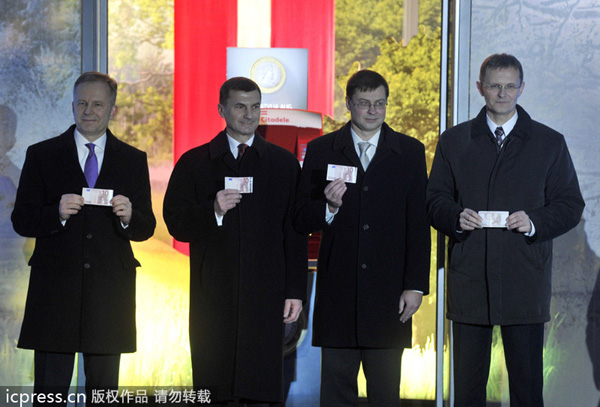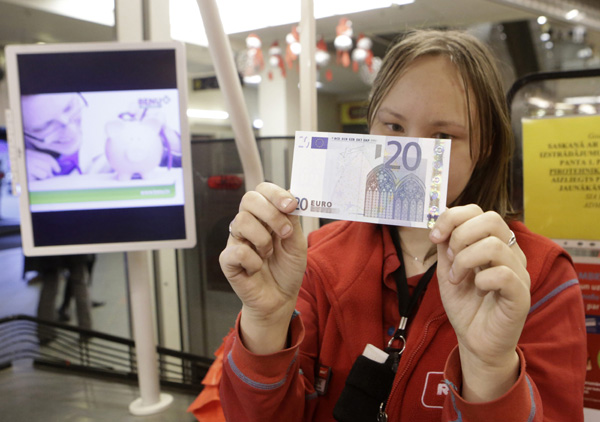Latvia becomes 18th eurozone member
Updated: 2014-01-01 16:13
(Xinhua)
|
|||||||||||
 |
|
Gov. of Bank of Latvia Ilmars Rimsevics, Estonian Prime Minister Andrus Ansip, Latvian Prime Minister Valdis Dombrovskis and Latvian Finance Minister Andris Vilks (L-R) hold euro notes in Riga, Lavia, Wednesday, Jan 1, 2014. Latvia celebrated the new year as the 18th member of the eurozone. [Photo/icpress.cn] |
 |
|
A cashier inspects an euro banknote at a supermarket in Riga January 1, 2014. [Photo/Agencies] |
RIGA - After three years of economic struggle, Latvia successfully emerged from a severe recession and became the 18th member of the eurozone on Tuesday.
After joining the European Union in 2004, Latvia took some time joining the euro, with the Latvian government deciding in 2010 to enter the eurozone on January 1, 2014.
It applied for eurozone membership in March 2013 and the European Union supported Latvia's application on the condition that it will curb its inflation and debt level.
Latvia's joining marks an easing of the debt-crisis pressure that has lasted for about five years.
There have been encouraging signs , particularly in recent months, that an economic recovery is underway in Europe. After contracting up until the first quarter of 2013, the European economy started to grow again in the following two quarters.
"Economic growth is expected to gradually gather pace over the forecast horizon to 1.4 percent in the EU and 1.1 percent in the euro area in 2014," said the 2013 Autumn economic forecast of the European Commission.
In 2015, the economic growth of the EU and the eurozone is expected to further accelerate, reaching 1.9 percent and 1.7 percent, respectively.
"There are increasing signs that the European economy has reached a turning point," Vice President Olli Rehn said at a press conference in September.
Analysts believe that by joining the eurozone, Latvia will not only benefit from EU's sound ground for economic growth, but also see more convenience from external markets such as China, the U.S., Canada and Japan, which have mutual investment or free trade deal talks with the EU.
At the same time, Latvia could enjoy lower borrowing costs and more foreign investment.
Moreover, joining the eurozone could trigger the devaluation of Latvia's currency and thus boost the country's export.
As part of celebrations marking Latvia's entry at midnight on Monday in central Riga, Valdis Dombrovskis, Latvia's acting prime minister, withdrew a euro banknote from a bank machine.
Dombrovskis said that it was an opportunity for the country's economic development as a member of the world's second largest currency, though it should not relax its fiscal policy.
"We should know how to use this opportunity in the best possible way so as to facilitate the economic and social development of Latvia," he said, adding that the move to become the eurozone's 18th member would make 2014 an historic year for the country.
Tens of thousands of Latvians gathered at a square in the capital to celebrate the New Year and the adoption of the euro.
The euro and Latvia's national currency lat have been simultaneously in circulation for two weeks, and the lat will cease to be legal tender on January 15.
Latvia is the second Baltic Sea country to adopt the euro, following Estonia in 2011.
Related Stories
Eurozone economy 'on course for recovery' 2013-06-04 10:23
France leads eurozone in offshore RMB payments 2013-04-27 07:35
Eurozone ministers urge Cyprus to shield small savers 2013-03-19 14:17
Eurozone faces continued contraction in 2013 2013-02-22 21:52
Eurozone registers 81.8b euro trade surplus in 2012 2013-02-16 03:40
Today's Top News
Putin meets Volgograd bombing victims
Diplomacy to focus on neighborhood
NGO ends SOS on funding
Palestinian envoy in Prague killed
Abe's policies to boomerang
Kim seeks ROK ties, warns US of nuclear 'disaster'
Putin vows to annihilate 'terrorists' after bombings
China to promote cultural soft power
Hot Topics
Lunar probe , China growth forecasts, Emission rules get tougher, China seen through 'colored lens', International board,
Editor's Picks

|

|

|

|

|

|





